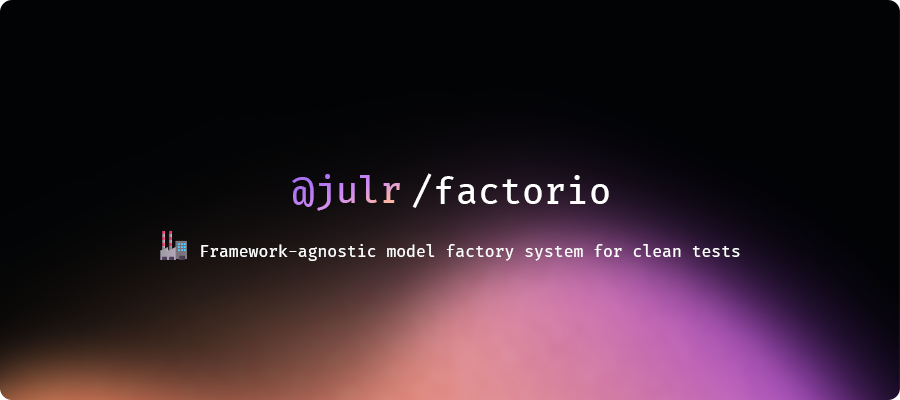@julr/factorify
Framework-agnostic model factory system for clean testing.
Built-on top of Knex + Faker, and heavily inspired by Adonis.js and Laravel.
Have you ever written tests, in which the first 15-20 lines of each test are dedicated to just setting up the database state by using multiple models? With Factorify, you can extract all this set up to a dedicated file and then write the bare minimum code to set up the database state.
Features
- Support for multiple databases ( SQLite, Postgres, MySQL, MSSQL ... )
- Integrations with test runners
- Define variations of your model using states
- Define relations
- Generate in-memory instances
Table of Contents
- Installation
- Integrations
- Defining database connection
- Creating factories
- Using factories
- Merging attributes
- Factory states
- Relationships
Installation
pnpm install @julr/factorify
Integrations
Integrations for some test runners are available below :
Defining configuration and database connection
Before running your tests, you must initialize Factorify with your database configuration.
This must be done BEFORE creating models via Factorify. In general, you can use the setup files system provided by the test runners.
import { defineFactorifyConfig } from '@julr/factorify'
const disconnect = defineFactorifyConfig({
// Can also specify a locale for faker
locale: 'fr',
// See https://knexjs.org/guide/#configuration-options
// for more information
database: {
client: 'pg',
connection: {
host: 'localhost',
user: 'root',
password: 'password',
database: 'factorify',
}
}
})
// Once you are done with your tests, you can disconnect from the database
await disconnect()
defineFactorifyConfig returns a function that can be used to disconnect from the database.
This is useful when you want to cleanly disconnect from the database after all tests have been run.
Note: You don't need to do this manually if you are using a test runner integration.
Casing Strategy
You can also define a specific casing strategy. By default, Factorify convert all keys to snake_case before inserting the models into the database. And before returning the model, it converts all keys to camelCase.
import { defineFactorifyConfig } from '@julr/factorify'
defineFactorifyConfig({
casing: {
// Convert all keys to snake_case before inserting into the database
insert: 'snake',
// Convert all keys to camelCase before returning the models
return: 'camel',
}
})
Creating factories
import type { User } from './my-user-interface.js'
const UserFactory = defineFactory<Partial<User>>('user', ({ faker }) => ({
email: faker.internet.email(),
referralCode: faker.random.alphaNumeric(6)
})).build()
The first parameter must be the table name. Make sure that you return an object with all the required properties, otherwise the database will raise not null exceptions.
Using factories
import { UserFactory } from './my-factory.js'
const user = await UserFactory.create()
const users = await UserFactory.createMany(10)
Merging attributes
You can override the default set of attributes using the .merge method. For example:
await UserFactory
.merge({ email: '[email protected]' })
.create()
When creating multiple instances, you can define an array of attributes and they will merge based upon their indices. For example:
await UserFactory
.merge([
{ email: '[email protected]' },
{ email: '[email protected]' },
])
.createMany(3)
In the above example
- The first user will have the email of
[email protected]. - The second user will have the email of
[email protected]. - And, the third user will use the default email address, since the merge array has a length of 2.
Factory states
Factory states allow you to define variations of your factories as states. For example: On a Post factory, you can have different states to represent published and draft posts.
export const PostFactory = defineFactory<Partial<Post>>('post', ({ faker }) => ({
title: faker.lorem.sentence(),
content: faker.lorem.paragraphs(4),
status: 'DRAFT',
}))
.state('published', (attributes) => ({
status: 'PUBLISHED', // 👈
}))
.build()
By default, all posts will be created with DRAFT status. However, you can explicitly apply the published state to create posts with PUBLISHED status.
await PostFactory.apply('published').createMany(3)
await PostFactory.createMany(3)
Relationships
Model factories makes it super simple to work with relationships. Consider the following example:
export const PostFactory = defineFactory<Partial<Post>>('post', ({ faker }) => ({
title: faker.lorem.sentence(),
content: faker.lorem.paragraphs(4),
status: 'DRAFT',
}))
.state('published', (attributes) => ({
status: 'PUBLISHED', // 👈
}))
.build()
export const UserFactory = defineFactory<Partial<User>>('user', ({ faker }) => ({
username: faker.internet.userName(),
email: faker.internet.email(),
password: faker.internet.password(),
}))
.hasMany('posts', { foreignKey: 'user_id', localKey: 'id', factory: () => PostFactory }) // 👈
.build()
Now, you can create a user and its posts all together in one call.
const user = await UserFactory.with('posts', 3).create()
user.posts.length // 3
Note that the foreignKey and localKey are optionals. If they are not defined, Factorify will try to guess them based upon the model name.
By default, the foreignKey is {tableName}_id and the localKey is id.
Applying relationship states
You can also apply states on a relationship by passing a callback to the with method.
const user = await UserFactory
.with('posts', 3, (post) => post.apply('published'))
.create()
Similarly, if you want, you can create few posts with the published state and few without it.
const user = await UserFactory
.with('posts', 3, (post) => post.apply('published'))
.with('posts', 2)
.create()
user.posts.length // 5
Finally, you can also create nested relationships. For example: Create a user with two posts and five comments for each post.
const user = await UserFactory
.with('posts', 2, (post) => post.with('comments', 5))
.create()
The followings are the available relationships:
hasOnehasManybelongsTomanyToMany(🚧 coming soon )
Stubbing models
In some cases, you may prefer to stub out the database calls and just want to create in-memory model instances. This is can achieved using the make and makeMany methods.
const user = await UserFactory
.with('posts', 2)
.make()
console.log(user.id)
The make calls will never hit the database and will assign an in-memory numeric id to the model instances.





